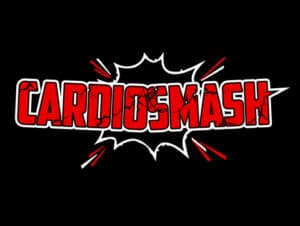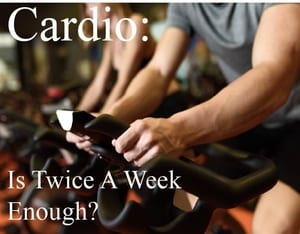We all know that cardio is a must-do when it comes to heart and lung health, maintaining endurance and keeping bodyfat to a minimum, and just being the healthiest we can be. Some people love doing cardio and enjoy the runner’s high or will happily swim laps for hours. But if you responsibly find yourself of a “cardio is a necessary evil” mindset, you’ve probably wondered, how often do I really need to do cardio? Is cardio twice a week enough?
If you just want to do the minimum amount of exercise to remain in good health, two 75 minute sessions of moderate intensity cardio, or 35-40 minutes of high intensity cardio, twice a week will be enough to satisfy the CDC’s recommendations minimum exercise guidelines. The higher intensity cardio will yield more benefits so it may be better to choose to train If you’re also doing some weight or resistance training a couple or more times a week you’ll be covering your bases quite well. This is just general advice for the average person. Cardio twice a week will definitely have some benefits but depending on your specific goals this may not be enough to maximize your results. At a minimum, this is enough exercise for you to not be considered sedentary. But if you are also active in other ways, such as weight training, sports, or even working a very physical job, this would probably be plenty of cardio for you.
Individual situations and different people’s goals can differ greatly. So let’s see when this advice holds true, and who needs more (or less) cardio than this.
Is cardio twice a week if that’s all the exercise I do?
As I alluded to already, the CDC recommends that Americans get 150 mins of moderate intensity, or 75 mins of high intensity, cardio done each week. If you are otherwise sedentary, this will be enough to keep your heart and lungs strong enough to be considered healthy and hopefully stave off the problems associated with lack of exercise.
These guidelines represent the minimum amount recommended. That is, most people will benefit from more exercise than this. In fact the CDC goes on to recommend two or more resistance training sessions each week in addition to the cardio.
So for an otherwise completely sedentary person, yes two long brisk walks, or bicycle rides, or whatever you enjoy doing will suffice. If combined with a balanced, healthy diet, this will be enough to stop you from turning into an unhealthy, obese individual.
That being said, why stop there? Unless you are genuinely so busy that two cardio sessions a week are really the maximum you can squeeze in, why not do three or even four sessions each week? The benefits will only be multiplied and your results will start to show much faster. As long as you are healthy enough to exercise and you don’t train too hard, more exercise will generally be a good thing.
I’m trying to lose weight, is cardio twice a week enough?
The most important factor when trying to lose weight is your diet. It’s quite possible to lose weight without any exercise at all, so long as you are eating at a caloric deficit. Don’t think that I am attempting to discourage you from exercising, because that is definitely not my intention, but assuming that you are eating at a caloric deficit (eating less calories each day than you burn), two solid sessions of cardio each week will definitely kickstart your results.
Let’s do a little math. For example if you are 180 lb and you walk at a fairly brisk pace of 3 mph for 75 minutes (half of your weekly recommendation). You’ll burn roughly 350-400 calories. This adds up to about 800 calories per week that you are using up, in addition to your normal metabolic use from normal activities and bodily functions. When you also cut your calories by 150 per day, this will add up to a caloric deficit of 1850 over the course of a week. There are 3500 calories in a pound of fat, so you’ll essentially lose 0.5 lbs per week. This is a pretty easy level of exercise and calorie reduction to maintain for steady, long term weight loss.
If you decided to increase the intensity, for instance by doing sprints or interval training, you would also increase your overall metabolic rate and continue to burn additional calories for hours via the EPOC effect (Excess Post-exercise Oxygen Consumption). If you opt for this type of training you can cut the exercise time in half.
If doing cardio twice a week, how intense should I train?
For most healthy people, a more intense approach will have more benefits, and consume less time. This is especially true for older people who are just starting to get into exercise. This study found that aerobic exercise of higher intensity exercise yielded greater results than moderate intensity aerobic exercise in older adults who had previously been sedentary.
Higher intensity cardio will definitely be more difficult, and perhaps even gruelling at first. But you’ll be able to cut your time spent exercising in half, and get better results. If you do something like sprints or running hills, you may even build some muscle too.
There are plenty of creative ways to get to 75 minutes a week of high intensity cardio. It could be a fast 15 minute run, 5 mornings a week, hitting the stairclimber hard for ~35 minutes twice a week, or going to a couple of spin classes. Do what you enjoy and go at it hard.
Doing a higher intensity workout is not for everybody, so if you are new to exercise be sure to consult with your doctor first and follow their recommendations.
I’m a weekend warrior: will that satisfy my exercise needs?
Perhaps you like to go for an all day hike on Saturdays. Maybe it’s a 50 mile bike ride, or 3 hours of basketball on Sunday. If you are a weekend warrior and have one or two days filled with exercise each week, this will work great to keep you active.
With activities like these it’s inevitable that sooner or later you’ll have to skip a week. Bad weather, family obligations, or something else could pop up so it’s important to have a backup plan in place so you can replace that exercise with a couple of other sessions during that week. If you skip one weekend, you’ll be going 12 plus days without exercise. If you skip two weekends in a row you’ll be going nearly three weeks. Be sure to avoid this by planning for upsets.
Bonus tip: Your backup plan needs to be something you like enough to actually do. If you really hate treadmills and stationary bikes, get a heavy bag or a speed bag, and make it fun.
Is 150 mins of moderate exercise or 75 mins of intense exercise better?
The added advantage of more intense training is the afterburn effect (EPOC). When you work out at a high intensity, your body continues to enjoy an accelerated metabolic rate for many hours afterwards. Also, you are really training your heart when you work out at a level of about 85% of your MHR (max heart rate).
Maximum heart rate can be calculated a number of ways but the simplest is to subtract your age from 220. So if you are 30 years old, you should aim for a heart rate of about 160 bpm (beats per minute). You can monitor your heart rate with a number of devices including fitbits, smart watches, or just the old-fashioned technique of counting your pulse for 6 seconds and multiplying by 10.
This higher rate will burn more calories per minute and will provide greater cardiovascular benefits that more moderate paced, longer sessions.
That being said, do what is more appealing to your specific situation, lifestyle, and goals. Most importantly, plan to perform whatever exercise you will actually do. If you are more likely to walk your dog around your neighborhood then do that. If this sounds boring to you and you prefer to push yourself, maybe you would rather do sprints.
I’m trying to get bigger, is twice a week enough cardio for me?
Let’s say that your primary goal is to gain muscle mass, but you wisely acknowledge that it is prudent to keep doing some cardio to make sure all your bases are covered. Again, you will be better off opting for shorter, more intense cardio sessions. High intensity interval training (HIIT) will stimulate your muscles and cardiovascular system without draining your energy or eating up precious muscle.
However, if you prefer to work your cardio into your days via more relaxed activities, like walking to the gym for example, that’s fine too, just don’t overdo the long, slow burn cardio. After 30-40 minutes of steady state cardio, your body starts to look for quick energy by metabolizing the proteins in your muscles, especially if you are working out on an empty stomach.
While the threat of muscle loss is minimal and this shouldn’t really be a major consideration, it’s still best to do things the most effective way possible. High intensity cardio also has the benefit of promoting muscle growth in many cases. Sprints, for example, can help grow your hamstrings, quads, and glutes while also giving a tremendous core workout. It takes a lot of effort to hold your trunk steady while your legs and arms are pumping at maximum speed, so your abs, obliques, spinal erectors and other components of the lumbo-pelvic-hip complex will be thoroughly worked.
In short, you still need to do at least 2 cardio sessions a week even if you’re trying to bulk up, but should aim for shorter, more intense workouts to maximize benefit and minimize muscle loss.
Related Posts:
Can Squats Be Considered Cardio?
Squats are a resistance exercise primarily designed to strengthen and build the muscles of the lower body. As anybody who has ever done squats will tell you, it is not something that most people can do continuously for a long period of time. It’s too difficult. Comparing squats to a typical cardio exercise like jogging is like comparing push-ups to dribbling a basketball. However if you structure your squat workout the right way, it can resemble cardio and have some of the same cardiovascular and fat loss benefits.
Can You (Should You) Do Cardio On Leg Day?
Ultimately, yes you can do cardio on leg day. However you will definitely want to do the weight training first. You see, you won’t perform as well on whichever one you do second, due to fatigue. If possible, spread them out a few hours, and don’t expect to train too hard on the cardio, your legs probably won’t handle it well.


